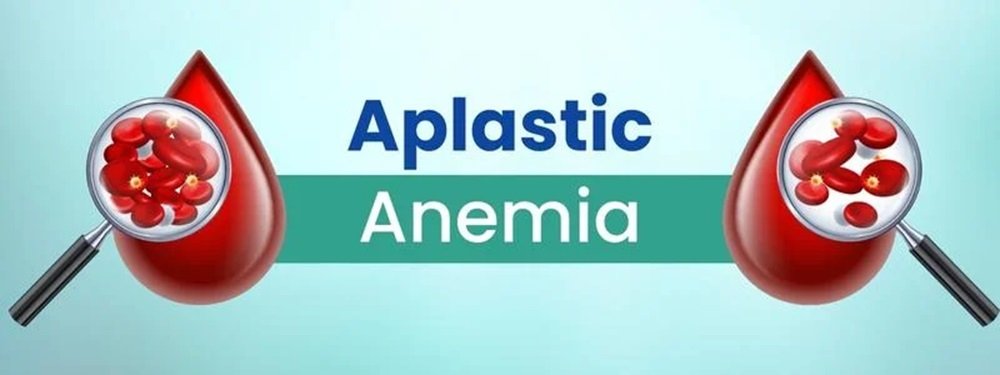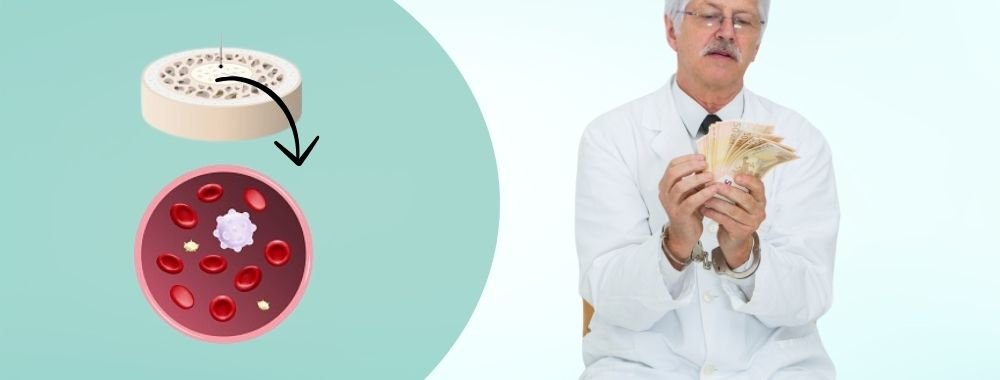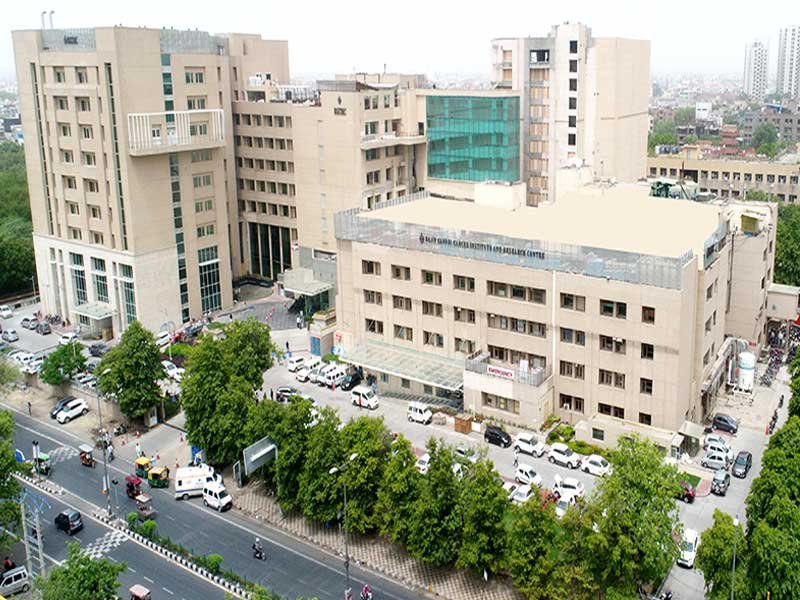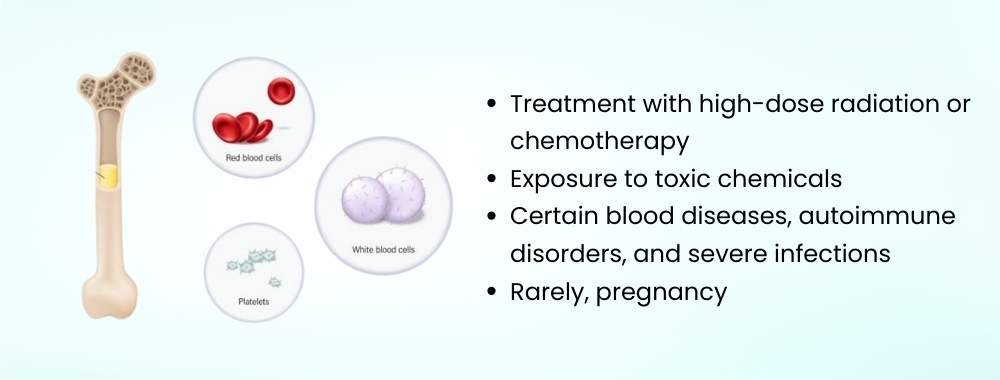India offers cost-effective Aplastic Anemia treatment with advanced care and bone marrow transplants, providing international patients top-quality care
Recovery Time
3-6 Weeks
Success Rate
80%
Hospital Stay
3-4 Weeks
Treatment Type
Treatment
Home Treatments Hematology Aplastic Anemia
Are you searching for Aplastic Anemia Treatment Cost in India?
India provides an affordable option, offering excellent care for aplastic anemia treatment at a much lower cost than in Western countries.
With advanced medical technology, personalized treatment plans, and skilled hematologists, Indian hospitals offer a range of treatments, including bone marrow transplants and immunosuppressive therapies.
This makes India a top choice for high-quality care at an affordable price.

Aplastic anemia is a condition where the body stops making enough new blood cells, which can cause fatigue, make you more likely to get infections, and lead to uncontrolled bleeding.
The goal of treatment for aplastic anemia is to help the body produce more red and white blood cells and platelets, which increases oxygen levels in the blood. Low red blood cell counts cause a drop in hemoglobin, so treatments focus on boosting these cells to improve overall blood health.
The cost of aplastic anemia treatment in India is typically lower than in other countries and depends on various factors such as hospital charges, doctor’s fees, diagnostic tests, and more. Here is a breakdown of the treatment costs:
Cost Component | Details | Estimated Cost in USD |
Pre-operative Consultation & Diagnosis | Consultations, X-rays, MRI scans, blood tests | 1200 USD |
Surgery Costs | Includes surgeon fees, type of surgery, and hospital stay | 27,000 - 33,000 USD |
Rehabilitation and Follow-up | Physiotherapy sessions, medications, supportive devices, follow-up visits |

Here is the list of factors that affect the overall cost of the treatment : Type of Treatment: The treatment approach—such as immunosuppressive therapy, blood transfusions, or bone marrow transplant affects the overall cost of treatment.
Hospital Charges: The type of hospital, its location, reputation, and whether it is accredited internationally influence the overall cost. Hospitals with advanced infrastructure may charge higher fees.
Doctor’s Fees: The experience and expertise of the hematologist or oncologist overseeing the treatment can also affect costs, as highly skilled doctors typically charge more.
Diagnostic Tests: Aplastic anemia requires various diagnostic tests, such as blood tests, bone marrow biopsies, and imaging studies, which add to the total treatment cost.
Hospital Stay and Support Services: The length of the hospital stay and additional support services, such as nursing and intensive care, can impact the final cost of treatment.
Individuals with aplastic anemia might face complications because of disease and treatment as well.
However, in some cases, the patient's body rejects a bone marrow, which the doctor calls graft-versus-host disease or GVHD.
It can make a person feel extremely ill, which includes symptoms such as:
Related Disorders:
Country | Cost Structure |
India | 27000-33000 USD |
United States | 250000 USD |
Germany | 180000-220000 USD |
Turkey | 58500-71500 USD |
◾ Key Takeaways
✅ Affordable Treatment Cost: The cost of aplastic anemia treatment in India is highly cost-effective compared to Western countries, allowing patients to receive treatment without compromising on quality care.
✅ Advanced Medical Technology: Indian hospitals are equipped with the latest technologies for treating aplastic anemia, providing precise and effective treatment for patients seeking care in India.
Aplastic Anemia cost
Treatment Name
Estimated Cost
Aplastic Anemia 25000-35000 USD
India provides exceptional quality care for aplastic anemia treatment by combining advanced medical technology with highly experienced hematologists. Key factors that contribute to India’s high standard of care include:
Paediatric Hemato Oncologist and Bone Marrow Transplant Surgeon 20+ Years of Experience
Dr. Vikas Dua
India has some of the best hematologists and oncologists, who are dedicated specialists in treating severe blood disorders. They have extensive training and are skilled in various treatment methods, including bone marrow transplants and immunosuppressive therapies.
These experts offer personalized care and effective treatment options for patients seeking aplastic anemia treatment in India.
Beds: 539
New Delhi
Beds: 230
New Delhi
Beds: 710
New Delhi
Beds: 650
New Delhi
Beds: 191
New Delhi
Beds: 310
New Delhi
Beds: 299
Gurugram
Beds: 380
New Delhi
Beds: 402
New Delhi
Beds: 1300+
Gurugram
Beds: 1000
New Delhi
Beds: 500
New Delhi
Beds: 450
Faridabad
Beds: 675
New Delhi
Beds: 500
New Delhi

Max Super Speciality Hospital, Saket

Aakash Healthcare Super Speciality Hospital

Indraprastha Apollo Hospital

BLK Max Super Speciality Hospital

Dharamshila Narayana Superspeciality Hospital

Fortis Escorts Heart Institute

Fortis Memorial Research Institute

Manipal Hospital Dwarka

Max Super Speciality Hospital Shalimar Bagh

Medanta - The Medicity Hospital

Moolchand Kharaiti Ram Hospital

Rajiv Gandhi Cancer Institute and Research Centre

Sarvodaya Hospital

Sir Ganga Ram Hospital

Venkateshwar Hospital
India is home to some of the best hospitals for aplastic anemia treatment, offering advanced care at an affordable cost. These hospitals are equipped with the latest technologies and are accredited by international bodies like JCI and NABH, ensuring they meet global standards for patient safety and quality of care.
Anemia can be diagnosed through several methods, including a physical examination, a review of medical history, and a blood test known as a complete blood count (CBC). The CBC measures various blood components, such as the number of red blood cells, white blood cells, platelets, and hemoglobin concentration.
Tests | Description |
Complete Blood Count (CBC) | This test examines the levels of various blood cells. Low levels of red blood cells, white blood cells, or platelets can indicate aplastic anemia. |
Blood Smear Test | This test analyzes the shape and size of blood cells under a microscope, helping to detect any abnormalities. |
Reticulocyte Count | It measures the number of young red blood cells, providing insights into bone marrow function. |
Erythropoietin (EPO) Level | EPO is a hormone that signals the bone marrow to produce more red blood cells. Low EPO levels can contribute to aplastic anemia. |
Bone Marrow Biopsy and Aspiration | This test assesses the health and cell production of the bone marrow, which is crucial for diagnosing aplastic anemia. |
🟢 Do’s Before Surgery
✅ Follow Your Doctor’s Instructions:Carefully follow all instructions from your doctor regarding medications, diet, and any specific lifestyle changes needed before treatment.
✅ Get Necessary Tests Done:Complete all recommended tests, such as blood tests, bone marrow biopsies, and imaging scans, to help your healthcare provider determine the best treatment plan.
✅ Stay Hydrated😀rink plenty of water to keep your body hydrated, which can aid in preparing for and recovering from treatment.
✅ Maintain a Balanced Diet:Eat a nutrient-rich, balanced diet to strengthen your immune system, especially before starting treatments like bone marrow transplants or immunosuppressive therapy.
🔴 Dont's Before Surgery
❌ Avoid Smoking and Alcohol:If you smoke or drink, it’s essential to stop, as these can interfere with your body’s ability to heal and respond to treatment.
❌ Don’t Take Certain Medications:Medications such as aspirin and NSAIDs can increase the risk of bleeding, so consult your doctor before taking any new medications.
❌ Avoid Exposure to Sick People:Stay away from individuals with infections, as your immune system may be more vulnerable during treatment.
The treatment of aplastic anemia depends on the severity of the patient's condition and age. It may involve observation, blood transfusions, medications, or bone marrow transplantation. Here are several treatment options for aplastic anemia:
Blood transfusions help control bleeding and relieve symptoms by providing blood cells that the patient’s bone marrow isn’t producing. Patients receive red blood cells to raise blood cell and platelet counts, which helps prevent excessive bleeding.
A stem cell transplant rebuilds the bone marrow using donor stem cells and may be the only successful treatment for patients with severe aplastic anemia. Once a donor is found, the diseased bone marrow is cleared with radiation or chemotherapy.
Healthy donor stem cells are then injected intravenously, where they migrate to the bone marrow and generate new blood cells. However, this procedure carries risks, including transplant rejection and potentially life-threatening complications.
These medications suppress the immune system to prevent it from making auto antibodies attacking stem cells. Anti-thymocyte globulin (ATG) and cyclosporine are examples of immunosuppressants used to treat aplastic anemia.
Drugs such as colony-stimulating factors (e.g., sargramostim, filgrastim, pegfilgrastim, epoetin alfa) and eltrombopag help stimulate the bone marrow to produce new blood cells.
Since aplastic anemia weakens the immune system, doctors prescribe antibiotics or antiviral medications to prevent infections.
The length of the hospital stay depends on the type of treatment received. However, recovery typically takes three to six months, and most people can return to their normal lives after treatment.
The success rate of aplastic anemia depends on various factors like age, type of procedure, and overall health yet the success rate is 80-85%.

Aplastic anemia is a rare condition with certain risk factors, including:
Why Choose Mejocare for Aplastic Anemia Treatment in India
✅ Team of Top Hematologists: We recommend doctors with over 20 years of experience in treating aplastic anemia, ensuring the highest quality of care.
✅ JCI/NABH Accredited Hospitals: We partner with hospitals equipped with state-of-the-art facilities, including the latest technologies such as robotics, machine learning, and advanced diagnostic and therapeutic equipment, providing comprehensive and personalized care.
✅ Other Benefits: Our services include prompt and detailed responses, accurate cost estimates, assistance with obtaining medical visas, and arranging accommodation in India. We also offer priority appointment scheduling with top doctors. Additionally, we ensure a smooth arrival experience in India with services such as airport pickup, hotel drop-off, hospitalization assistance, and more.
Aplastic anemia is a rare disease that can be treated with medications or transplants. In cases where medication is ineffective, a stem cell transplant may be a viable option. Patients typically undergo several diagnostic tests to determine the condition. Although the exact cause of aplastic anemia is rarely identified, doctors prescribe treatments to manage symptoms. If you experience fatigue, shortness of breath, a rapid or irregular heart rate, or other related symptoms, it’s important to consult a doctor immediately.

Medically Reviewed By
Dr. Aryan Malhotra is a highly respected and compassionate medical professional with a strong academic background. He holds an MBBS and MD degree from DTMU University in Georgia. Driven by a deep sense of duty, he is dedicated to providing exceptional care to his patients.
The cost of Aplastic Anemia Treatment in India ranges from 25000-35000 USD.
The success rate of Aplastic Anemia Treatment in India is around 85-90%.
Patients can expect the stem cells given during the procedure to start generating new blood cells within 2 to 3 weeks. Once this process, called engraftment, occurs, you'll likely be discharged from the hospital.
Recovery of a bone marrow transplant varies but typically takes about 3 months, sometimes longer. Your body regenerates cells, requiring energy and causing initial tiredness. Strength usually improves weekly. By the third month, hair growth speeds up, and a gradual return to regular exercise is possible. Although you'll feel better over time, recovery can extend from 2 to 3 months to a year post-transplant for most individuals.
You might encounter several concerns like infections, low platelets, and red blood cells, leading to pain and fluid overload. There might also be risks of respiratory distress, organ damage, and even graft failure. These are some common issues to be aware of during your recovery process.
Physiotherapy involves exercises and guidance to improve strength, balance, and mobility. A trained physiotherapist evaluates your abilities, devises a personalized treatment plan, and recommends exercises to enhance your daily activities. They might assess your functional capabilities before discharge and suggest suitable aids while educating you on the benefits of independent exercise.
Yes, it is necessary to have a companion.
Following a bone marrow or stem cell transplant, doctors typically advise against traveling internationally for at least six months. Most people require routine checkups. Additionally, you might require blood transfusions at this time.
Yes, you can do your own research and choose your therapist.
You can use Paracetamol regularly to manage mild to moderate pain. Moderate pain can be managed using non-steroidal anti-inflammatory drugs (NSAIDs) like diclofenac or ibuprofen.
Yes, insurance will cover the cost of an Aplastic Anemia Treatment in India.
To discover the top doctors or hospitals in India, you can visit our website, mejocare on the doctors' page, you can filter and find the finest doctors, while on the hospital page, you can identify the best hospitals. Additionally, you can reach out to us, and we will gladly offer you all the necessary suggestions and information you need.
Typically painless and performed while you're conscious, the procedure spans approximately 3 to 4 hours. Should an initial removal of cells prove insufficient, a follow-up session might be necessary the next day.
No, there is no waiting list for Aplastic Anemia Treatment in India.
You'll need blood tests, a chest X-ray, a PET scan, and heart tests. Additionally, a bone marrow biopsy may be required. Donors also undergo specific tests as part of the evaluation process to ensure compatibility and safety for the transplant procedure.
Most bone marrow donor procedures are performed under general anesthesia.
Typically, individuals can consider returning to work within 2 to 4 months following their transplant. However, the exact duration may vary based on individual circumstances and various influencing factors.
Maintaining food safety is crucial for those with weakened immune systems. It's essential to follow these guidelines to reduce the risk of food-related illnesses. Alongside safety measures, ensuring a nutrient-rich diet with adequate calcium, vitamins, and proteins is crucial for recovery and preventing infections during treatment. Avoiding high-lactose foods and opting for low-lactose alternatives helps manage potential side effects while prioritizing protein and calorie intake is essential for supporting your body through illness and treatment.
It's vital post-surgery to monitor your vital signs, care for your wound, address any complications that may arise, undergo rehabilitation services, and attend follow-up appointments. These steps play a crucial role in your recovery, ensuring everything progresses smoothly and promoting your overall health.
Our care team can help you.
